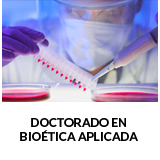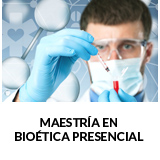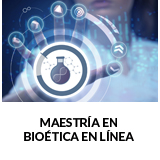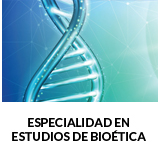
Versión en español
| MONTHLY NEWS | |
 |
|
|
Webinar: "What dones a Bioeticist do?" The Master's degree in Bioethics (face-to-face modality and online modality) invites you to the Webinar: "What does a Bioethicist do?" On March 1, 2022 at 6:00 p.m. CDMX, via Zoom. Where will graduates of the faculty participate as guests:
|
|
 |
|
|
We analyze, in Inagural Lecture, The Transhumanism and Emerging Challenges for the Bioethics of the 21st Century The Faculty of Bioethics held the Inaugural Lecture "Transhumanism and emerging challenges for bioethics in the 21st century" by Dr. Elena Postigo, a graduate in Philosophy and a doctorate in Bioethics from the Sacro Cuore University of Milan. The former vice-rector for research at the Ceu San Pablo University in Madrid from 2009 to 2011 and adjunct professor of anthropology and bioethics at the Francisco de Vitoria University in Madrid, where she also directs the Institute of Bioethics, and whose area of research focuses on the bioethics of emerging issues raised by 21st century biotechnology, addresses transhumanism as a cultural and scientific current with a moral duty to "improve" human beings through technology, innovating in ways to alter human nature, establishing a constant search of the welfare state to optimize the functioning of the human being both as a species and as a community.
|
|
 |
|
|
Bioethics Academics Participate in Open Parliament to discuss Conscientious Objection On February 2, the Health Commission of the Chamber of Deputies convened an Open Parliament (blended) in which the different positions on Conscientious Objection were analyzed to address the legal vacuum that exists in article 10 Bis of the General Health Law. Academics and experts on the subject participated sharing their points of view, including academics from the Faculty of Bioethics of our Universidad Anáhuac México. Representing the Faculty where: Dr. Martha Tarasco and Dr. Rosario Laris, as well as Dr. Agustín Herrera, Dr. José Manuel Madrazo and Dr. Antonio Moreno.
|
|
| MONTHLY EVENTS | |

|
|
|
Check the upcoming events:
|
|
| MEDICINE AND ETHICS JOURNAL | |
 |
|
|
The crisis experienced due to the pandemic created by COVID-19 has developed the urgent need to expand the horizons of bioethics, to bring it to the reflection and solution of problems that concern all human beings and that are intrinsically connected with each other. others. Today more than ever it is necessary to think about human relations and the environment we inhabit, attending to particular and local circumstances from a global horizon, methodology, principles and proposals. Today the problems are no longer individual; now they are collective and shared, on a global scale, persistent over time, and require great collective efforts to mitigate and eradicate them. Thus giving the slogans with which global bioethics arises. In the first article, Henk ten Have, presents his article COVID-19 and global bioethics, where he proposes three approaches to respond to the pandemic: a) exceptionality, b) controllability, and c) the binary approach. With what helps to recover the relationship between people, as well as solidarity, which are the fundamental principles to recover the dignity and protect the health of human beings. In the second article by Cristina de la Cruz "Bioethics and global justice. Critical analysis of the global COVID-19 vaccination strategy", the author considers the ethical problem of the criteria for the distribution of vaccines from global justice. Discussing thus, proposals for a fair distribution of vaccines, under the assumption that all countries should have the right to access them, since health is a common good and an international human right. In the third article of this issue, "Global bioethics: new arguments about animal rights?", by Gómez Álvarez, allows a renewed discussion around the old problem about whether or not animals have rights and, after analyzing the existing bibliography, discovers that the arguments used are almost always the same, with the exception of some that are novel. In the fourth article "Bioethical implications in the contagion effect of suicide", by Érika Benítez, she looks at a painful reality that has become more acute in this time of pandemic, which is suicide. The perspective from which the author addresses this problem is from the role and responsibility of the media in the "contagion effect" of suicide. The article by Pasquale Gallo and Joseph Tham, "Comparison of NaProTechnology with Assisted Reproduction Techniques" where they present an interesting approach to NaProTechnology in comparison with current assisted reproduction techniques. The last article in this issue, "Self-assessment of knowledge and application of the code of conduct by public health servants in Tlaxcala", Óscar Castañeda and Rosalba Jaramillo make an interesting analysis of adherence to the codes of conduct of public servants in a hospital in Tlaxcala, with the aim of verifying that, the greater adherence to the code, the higher level of user satisfaction and better quality in the services provided. Finally, this issue presents a review: The review that is presented is about the book "Bioethics" by Guerrero Martínez, where he offers a novel literature in the field of bioethics, since it analyzes topics that are not limited to the field of clinical bioethics, but that range from the use from biotechnologies to the debate on animal rights and, also, insofar as they are approached and reflected upon from the philosophical point of view of great thinkers, such as Kierkegaard, Gadamer, Derrida and Nussbaum. From Editorial number 1, Vol. 33.
|
|
| ARTICLE | |
 |
|
|
Bioethics and global
justice. Critical analysis of the global vaccination strategy COVID-19 - Cristina de la Cruz
Ayuso
|
|
| Resources and latest publications in Bioethics | |
 |
|
|
CONBIOETHICS RESOURCES: January Catalog 2022
|
|
| Agreements | |
 |
|
|
|
|
| Meet our researchers from the Faculty! | |
 |
|
|
Who is Lorea Sagasti
Pazos?
|
|
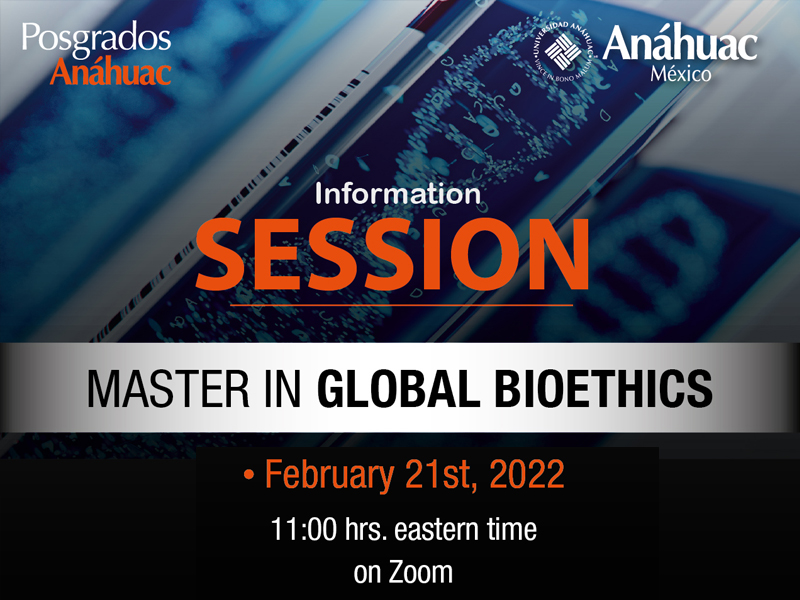
|
|
|
Openings: |
|
| Posgraduate | |
|
|
|
More information:
Facultad de Bioética
Dra. Ma.
Elizabeth de los Rios Uriarte
elizabeth.delosrios@anahuac.mx
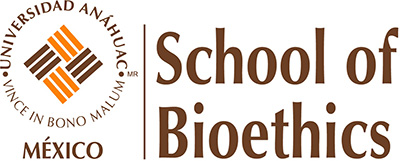
Follow us!



 Contáctanos
Contáctanos
 Contact us
Contact us

